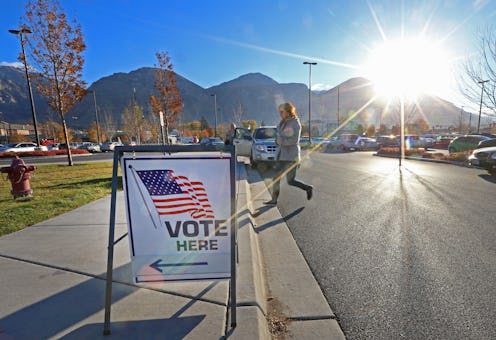News
8 Voting Rights Organizations You Should Know Before 2020

Ahead of the 2018 midterms, voter suppression was a huge topic for the Georgia races. And with 2020 on the horizon, addressing the issue nationally is going to be a big deal. Not just the presidential election, but 11 governorships, a third of U.S. Senate seats, and all 435 House seats will be up for grabs. With so many races, you might be wondering what you can do to help prevent voter suppression. Ahead of 2020, voting rights organizations are working to level that playing field.
On Election Day 2018, Georgia voters reported faulty voting machines, huge lines, and insufficient numbers of provisional ballots disproportionately affecting communities of color. These reports reinforced accusations that the Republican gubernatorial candidate, Georgia's then-Secretary of State Brian Kemp, purposely failed to prepare the state for the election in order to influence his own race. Kemp has denied allegations of intentional voter suppression.
But reported voter suppression isn't just an issue that comes up in Georgia. Early voting restrictions in North Carolina and voter ID laws in Texas, Mississippi, and Alabama have also been called out for narrowing the number of voters. Laws preventing those with prior convictions from casting ballots in Tennessee and Kentucky disproportionately affect people of color to the same effect, The New York Times reported.
If you've found some organizations you like, make sure to amplify their reach by calling your representatives and urging them to support the platforms they're fighting for.
Let America Vote
Let America Vote is an organization former Missouri Secretary of State Jason Kander started last year to protect voting rights across the country. There are a number of action items Let America Vote will get you started with, from hosting a "Voting Rights House Party" to providing housing for volunteers, to door-knocking for 2020 candidates that are likewise fighting voter suppression.
Common Cause
Common Cause works to make the process of voting more democratic from all angles — they're fighting to expand voting rights, eliminate gerrymandering, and are even pushing for popular vote presidential elections (see you later, Electoral College!). You can of course donate, but their team has also put together a bunch of ways to help you take action yourself. Use their step-by-step guide to write a letter to the editor of your local newspaper, volunteer at a Common Cause state office, phonebank or textbank, organize your community — whatever you want to do to help, they've got you covered.
League Of Women Voters
Donate to or contact your local League of Women Voters (LWV) chapter to see how you can help. LWV volunteers go out ahead of elections to register new voters (hint: all those folks turning 18 in the next two years!) — you can sign up for email and text alerts at the LWV website to learn how to organize in your community.
American Civil Liberties Union
The ACLU fights civil rights injustices on a number of fronts, and one of those is voter suppression. Ahead of the election they filed two lawsuits against Brian Kemp and all Georgia county registrars to combat the repressive voting requirements. You can also sign their petition to pass the Voting Rights Advancement Act, which restores protections to the Voting Rights Act stripped by a 2013 Supreme Court Decision. Additionally, you can donate to ACLU chapters in states that feel voter suppression the most — here's a comprehensive list.
Spread The Vote
Spread the Vote is an organization dedicated to helping people get IDs ahead of Election Day. IDs are necessary to participate in lots of areas of society, such as getting employment, opening a bank account, or finding housing. Additionally, voter ID laws in particular disproportionately affect communities of color, the elderly, and new voters. Spread the Vote helps people to navigate their state's ID laws and assists with everything from application fees to driving you to the DMV to get your ID. You can join a local chapter (or start one!), and donate at their website.
Election Protection
Election Protection is a great resource for everything you and your Twitter followers might need to know about voting. That includes polling locations and absentee ballot information, as well as a hotline to report anything that goes awry on voting day. You can call (866) OUR-VOTE if you think someone is illegally being denied their vote, if your polling machine breaks, if there aren't enough ballots, etc.
If you are a legal professional, you can also sign up to volunteer with Election Protection in their on-the-ground efforts to protect voting rights. If you're not a legal professional, don't worry! You can sign up to volunteer as a poll monitor on Election Day.
Asian Americans Advancing Justice/Asian Law Caucus
Asian Americans Advancing Justice (AAAJC) works to knock down language barriers for voters across the country. They provide a voter hotline with assistance in nine Asian languages, as well as election resources for people to check their voter registration, understand their ballot, and know their voting rights ahead of time. Get involved by applying for an internship or donating at their website.
Brennan Center For Justice
Named for one of the most influential liberal SCOTUS judges to grace the bench, William J. Brennan, The Brennan Center is a leader in civil rights research and litigation. Their work to protect the integrity of voting rights and elections is incredibly thorough — if you need a good place to start educating yourself on voter suppression, they have lots of resources. Become a monthly donor, give in someone else's name, or sign up for their monthly newsletter to stay informed about their work.
Voter suppression is an issue that undermines democracy. It's not always noticeable how it works, but ignoring the will of the people can have hugely negative ramifications for the future of the country. These organizations are among those fighting for every voice's right to be heard.